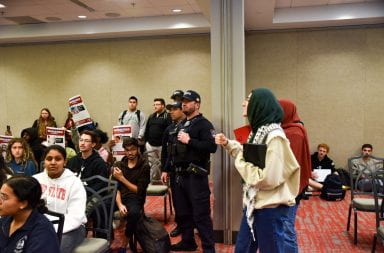
Credit: Denny Check / Managing Editor of Design
The results shown are as of 4 a.m. on Wednesday and are based on updates from the Franklin County Board of Elections and the Ohio Secretary of State websites.
Statewide Issues:
Three statewide measures are on the ballot in Ohio in 2015 with issues about legislative redistricting, monopolies and marijuana to a vote.
Issue 1: Passed
The ballot measure would change how state congressional districts are drawn. Currently the process of drawing districts is left to a five-member partisan commission. Critics say this system leads to a conflict of interest since the majority party has the ability to draw districts with political motivations. If passed, a new seven-member commission would be created to draw districts. The minority party would have at least two seats on the commission, in hopes of making less partisan districts. The issue was backed by both major political parties.
Yes: 71.49%
No: 28.51%
100% of precincts reported
Issue 2: Passed
The proposed anti-monopoly amendment would ban groups from using ballot initiatives monopolies or oligopolies in the Ohio Constitution. If passed, the five-member Ohio Ballot Board would have jurisdiction over if a proposed ballot initiative would lead to a monopoly. If the board were to determine an initiative to be a monopoly, the ballot initiative will be split into two—the first asking voters to allow for a monopoly and the second asking them to approve the measure itself. Some consider the issue as a direct response to Issue 3.
Yes: 51.7%
No: 48.3%
100% of precincts reported
Issue 3: Rejected
If passed, Issue 3 would legalize recreational and medicinal marijuana in Ohio. Under the constitutional amendment, ten predetermined facilities would have the exclusive rights to grow the narcotic. Retail marijuana stores would only be able to sell products grown at one of the ten sites. Proponents, led by ResponsibleOhio, argue the legislation would foster economic growth due to new sources of tax revenue as well as job creation. Opposition to the measure comes from both anti-drug activists and marijuana activists who believe the issue would create a cartel of marijuana growers.
Yes: 35.86%
No: 64.14%
100% of precincts reported
Columbus Mayor: Andrew Ginther
The election to succeed five-term Democratic mayor Michael Coleman pitted two Democrats against each other—Franklin County Sheriff Zach Scott and Columbus City Council President Andrew Ginther. The election is entirely non-partisan with the the top two vote-getters in the May primary advancing to the general election.
Andrew Ginther (D): 58.73%
Zach Scott (D): 40.24%
Write-in: 1.03%
717 of 717 precincts reported
Columbus City Council: Zachary Klein, Elizabeth Brown, Michael Stinziano, Jaiza Page and Shannon Hardin
There were two separate races for Columbus City Council this year, both a general and a special election. There are a total of five open seats this election cycle. The general election featured nine candidates to fill four seats on council. Two of the candidates running are incumbents along with six newcomers. Zachary Klein, Ibrahima Sow, Dimitrious Stanley, and Michael Stinziano are all Ohio State alumni.
Zachary Klein: 18.14%
Elizabeth Brown: 17.51%
Michael Stinziano: 17.44%
Jaiza Page: 15%
Dimitrious Stanley: 13.04%
John Rush: 8.51%
Besmira Sharrah: 5.26%
Ibrahima Sow 4.92%
Write-in: 0.17%
717 of 717 precincts reported
The special election is to fill a seat that was vacated by Troy Miller. After Miller’s resignation, Shannon Hardin was appointed to hold the seat until the 2015 election. The winner of the special election’s term would expire in 2017.
Shannon Hardin: 70.07%
Ashley Wnek: 28.67%
Write-in: 1.25%
717 of 717 precincts reported


